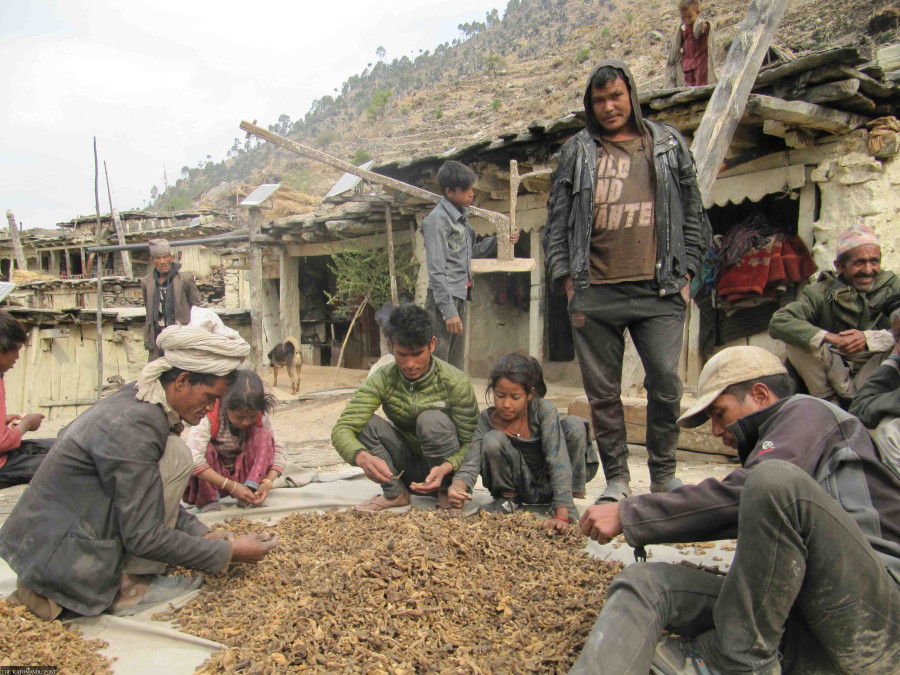Money
Decline in medicinal herbs output worries highlanders
Locals in Karnali stay in the forest for three months to collect the herbs by making temporary shelters as soon as winter passes.
Krishna Prasad Gautam & Raj Bahadur Shahi
Locals in the mountain region, who eke out a living by selling herbs, are largely worried about the decline in production in recent years.
Selling medicinal plants has become the main source of income for locals in the highlands of the Karnali Province for generations.
Around 150 families in the Mugum Karmarong Rural Municipality-2 collect Cordyceps from mid-May to mid-July, Kutki (Picrorhiza kurroa) from mid-September to mid-October and wild garlic (Allium wallichii) from mid-October to mid-November, every year.
Situated at an altitude of 3,275 metres, the land is suitable for growing foxtail millet.
“We can grow food for only three months,” said Chhiring Tamang, a local. “The earning from medicinal plants, however, is key for our livelihood.”
The villagers migrate to lower areas during the winter and return to collect the herbs when spring begins.
The locals of Shobha, Ghatta Lekh, Talla Lekh, Kampha, Lumsa and Balchaur among other villages of Chhayanath Rara Municipality, Mugu stay in the forest for around three months to collect the herbs by making temporary shelters.
A medicinal herb such as Kutki is traded at the rate of Rs1,650 per kg.
Tamang said the collection has declined over the years, adding, “I collected 300 kg of Kutki and 200 kg of Bholte last season, but the collection this season has shrunk to 100 kg of each.”
“My income from herbs plunged by Rs50,000 this season,” Tamang added. “The haphazard collection and climate change might have affected the production.”
According to Karma Lama from Mugu, herbs such as Guchi Chyau (Morchella esculenta), Chiraito (Swertia chirayita) and Satuwa (Paris polyphylla) among others were easily available in the local community forest until five years ago.
“Nowadays, they are not easily available.”
The locals need to travel to far-off places like Koiki and Thulo Ban to collect them. The journey takes an entire day on foot.
“Our ancestors made a living by selling these herbs," said Lama.
Division Forest Office at Mugu has permitted the collection of 38.3 tonnes of Kutki, 42.2 tonnes of Jatamasi (Nardostachys jatamansi), 29.6 tonnes of Padamchal (Rheum australe), 5.4 tonnes of Chiraito and 7.3 tonnes of Satuwa this fiscal year.
Despite the region being the hub for exotic medicinal herbs, a lack of budget has made it difficult to process, store, market and commercialise the herbs, according to Jit Bahadur Malla, Minister for Industry, Tourism, Forest and Environment of Karnali Province.
Around a month ago, locals of Nekpa village in Humla district collected Setak Chini (Moringa Oleifera). But, it rotted because of the snowfall in the last week of January before they could process it.
Every year, herbs worth billions rot away, locals say.
“It is perhaps our fate,” said Tek Bahadur Lama, a local trader. “We spend months collecting the medicinal plants but our effort goes in vain at the time of selling.”
The snowfall last year destroyed nearly 90 tonnes of medicinal plants, Lama added.
The price of Setak Chini ranges from Rs400 to Rs600 at the local market.
Around 20 tonnes of Setak Chini has been collected in several municipalities in the Jajarkot district this fiscal year.
The District Forest Office, however, has given a transportation permit for only 10 tonnes of medicinal plants to traders.
The existing provision makes it mandatory for traders to get a permit from the relevant forest offices to transport the herbs.
Traders complain they are permitted to transport far fewer medicinal plants than they collect.
“I have been visiting the forest office regularly for the past three months to request for a permit, but the office has not provided it citing that the Environmental Impact Assessment report is yet to be approved," said Lama, who is worried about losing income due to the delay in transporting them.
Authorities barred people from collecting Cordyceps for nearly two years in Dolpa, Mugu and Jumla districts because of the Covid-19 pandemic.
Though the prohibition was lifted last year, the collection has drastically reduced.
Botanist Kamal Sharma argues that the non-collection of Cordyceps for two years has affected its reproduction process.
“Lack of timely rain, increase in human activities, deforestation, forest fire and other effects of climate change have caused a reduction in the production of medicinal plants,” said Sharma.
“While a Division Forest Office needs to carry out an Environmental Impact Assessment, the community forest office need to make a working procedure for the collection of medicinal herbs,” said Sher Bahadur Pariyar, chief of the Division Forest Office, Rulum (West).
“The issues regarding transport permits have occurred as collectors end up collecting more herbs than the amount mentioned in the procedure.”
“The permit to transport herbs exceeding such an amount is granted in the following year,” Pariyar added.
The transport permit, however, is not the only issue.
Rabinnath Shukla, a medicinal herb trader, said around 200 tonnes of herbs have remained stranded at Nepalgunj, a city in western Tarai, for not being included on the Indian plant quarantine list.
“They are on the verge of rotting,” said Shukla, adding he owns around Rs9 million worth of the stranded herbs.
Around 30 types of medicinal plants collected in Karnali are brought to Banke district.
Sakil Ahamad Jasgad, a trader from Nepalgunj, claims 300 tonnes of his medicinal herbs have remained in storage. “The government needs to facilitate us in the export of herbs,” said Jasgad. “A prolonged delay will only affect the quality of the herbs and the prices they deserve.”
Traders said that the provision requiring them to get a separate transit permit from the Uttar Pradesh state of India has further affected business.
It is equally frustrating to transport the herbs within Nepal, they say.
“We are stopped at around four dozen checkposts,” said Jasgad.
The Karnali Province exported 1,025 tonnes of 79 types of medicinal herbs last fiscal year, according to the Provincial Forest Directorate, Karnali.
The herb business provides jobs to around 50,000 individuals every year.




 20.12°C Kathmandu
20.12°C Kathmandu
.jpg)














